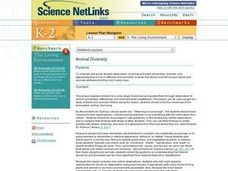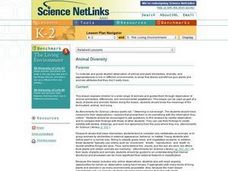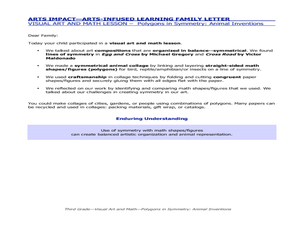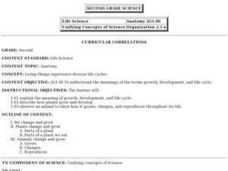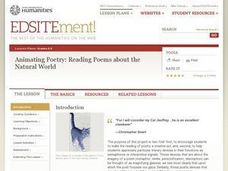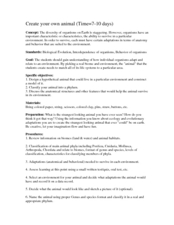Curated OER
Animal Diversity
Students explore biology by completing science worksheets in class. In this animal anatomy lesson, students read the book The Adventures of Marco and Polo and identify the animals mentioned in it. Students examine a real life animal and...
Howard Hughes Medical Institute
Lesson 2: Gorongosa National Park
How has Gorongosa National Park changed over time? Discover the park's rich history, dating back to primitive human times, through an interactive timeline and scientific reading. The second installment in an eight-part series explores...
Curated OER
Animal Diversity
Students explore the outdoors. In this animal diversity lesson, students observe nature and identify various species of animals, both small and large. Students discuss animal habitats and how humans influence their living conditions.
Staten Island Zoo
The African Savanna
Are you thinking about taking your class to the local zoo? Kids of all ages love visiting exotic animals in order to learn about biodiversity, habitat, and animal adaptations. Here is a 44-page activity guide that provides educators with...
Curated OER
Perspectives on Animals
Engage your class in a discussion about humane treatment of animals by recognizing the basic rights of all races, religions, classes, etc. Have volunteers stand on a milk crate without shoes until they become uncomfortable as an example...
Curated OER
Animal Diversity
Students use the Animal Diversity E-Sheet to access the Where Can Animals Live? online book.
Sea World
Marine Animal Husbandry and Training
Step into the role of a zoo director with several activities about animal training and running a zoo. Kids calculate the amount of food each animal needs, design a habitat for penguins, decide how to breed bottlenose dolphins, and train...
ARKive
Penguin Diversity – Mask Making
Penguins are very diverse and well-adapted birds; they live on islands, in warm and cold climates. Little ones examine penguin diversity and discuss the highly functional adaptive traits that have helped them survive in some of the...
Education Outside
Creature Jeopardy!
After conducting research on a given scientific animal name, group members take a walk around their school and look for the specified animals in that classification. Then, they come back to their worksheets and create five creative clues...
Curated OER
Polygons in Symmetry: Animal Inventions
Fourth graders use polygons to create animal figures with symmetry. In this polygons and symmetry lesson, 4th graders create a symmetrical animal collage by cutting and gluing geometric shapes and figures from math activities.
Curated OER
Living Things Experience Diverse Life Cycles
Second graders will study and explain the meaning of growth, development, and life cycle. They describe how plants grow and develop and observe an animal to show how it grows, changes, and reproduces throughout its life.
Polar Trec
Animal Monitoring Introduction
Not only do mealworms taste great, they are also great for classroom science lessons. In pairs, young scientists observe and record what they see as they check out what their mealworms are doing from minute to minute. Each minute...
Curated OER
Animal Diversity
Students examine plants and animals for their similarties and differences. They are read stories and note how the animals in the stories do not have the qualities that real animals have. They complete a worksheet to end the instructional...
National Endowment for the Humanities
Animating Poetry: Reading Poems about the Natural World
Students complete poetry analysis activities. In this poetry analysis instructional activity, students consider the use of imagery and sound devices in poetry. Students translate poetry into another art, read a diverse selection of...
Curated OER
Sibling Relationships in the Animal World
Students research sibling relationships in the animal world. In this animal science lesson, students read the book, Sisters and Brothers: Sibling Relationships in the Animal World and discuss the sibling relationships. Students choose an...
Curated OER
Build a Hawaiian Bird
Fifth graders make a model of a bird. In this animal adaptations lesson, 5th graders examine how birds adapt to their environment, using Hawaiian birds as an example. Students create their own bird using adaptation paper cut outs...
Curated OER
Camouflage
Here is a lesson which incorporates ingenious hands-on activities that simulate how many animals use camouflage as a survival technique. This lesson clearly outlines how to implement the activities and discussion sessions found in it....
Curated OER
Blubber Gloves
The ways that animals adapt to their environments is quite remarkable. In this life science instructional activity, fifth graders take a look at some of the ways that aquatic animals that live in Arctic or Antarctic waters survive. They...
Curated OER
Create Your Own Animal
Students design and create their own hypothetical animal. In this biology lesson, students identify the factors organisms need to survive. They classify their animals according to its correct phylum.
Curated OER
Invertebrate Diversity
Students observe different animals with bilateral symmetry. In this biology instructional activity, students compare how these animals move. They discuss the evolutionary history of observed animals.
Curated OER
Fine Art to Animation With Keith Haring
Students examine artwork and Flip Books by Keith Haring. They analyze elements of line and color through drawing and create their own morphes using a computer animation marker.
Curated OER
Basic Animal Behavior in Domesticated Animals
Students investigate animal behavior, examining the nervous system and the physiology of the brain and the fight or flight response. They simulate animal behaviors and discuss the difference between an instinct and a behavior.
Curated OER
Animal Adaptations: Focus on Bird Beaks
Sixth graders explore bird beaks as animal adaptation. In this bird adaptation instructional activity, 6th graders conduct an experiment to determine the connection between the shape of a bird's beak and the food it eats.
Curated OER
The Loneliest Animals
Students examine the different species that are headed towards extinction. In this animal population instructional activity students compare the causes of extinction, research an endangered species and present an oral report.




